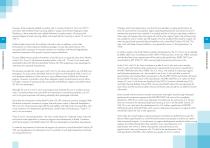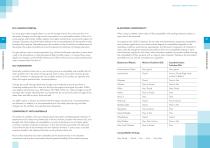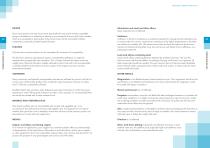
Catalog excerpts

AEROSHELL TURBINE ENGINE OILS The earliest gas turbine engines were developed using straight mineral oils but the operational requirements for low temperature starting, either on the ground or at high altitude (re-lights) led to the development of a range of straight mineral oils with viscosities far lower than those of conventional aircraft engine oil of that time. For example, oils with viscosities between 2 mm2/s and 9 mm2/s at 100°C became standard for gas turbine engines, compared with viscosities of 20 mm2/s to 25 mm2/s at 100°C for piston engine oils. Although demand for the low viscosity straight mineral turbine oils is diminishing, the following list tabulates the range of specifications covered. MIL-PRF-6081D Grade 1010 - AeroShell Turbine Oil 2 DEF STAN 91-99 (DERD 2490) - AeroShell Turbine Oil 3 DEF STAN 91-97 (DERD 2479/0) - (AeroShell Turbine Oil 9 - grade now withdrawn) DEF STAN 91-97 (DERD 2479/1) - (AeroShell Turbine Oil 9B - grade now withdrawn) The higher viscosity 9 mm2/s oils in the foregoing range were required for the highly loaded propeller reduction gears of turboprop engines. In some of these engines the natural load carrying characteristics derived from the viscosity of the oil alone was not enough and required improvement by an EP (Extreme Pressure) additive. The resultant blend, AeroShell Turbine Oil 9B (grade now withdrawn), was used by aircraft and helicopter operators. With the progressive development of the gas turbine engine to provide a higher thrust and compression ratio, etc., the mineral oils were found to lack stability and to suffer from excessive volatility and thermal degradation at the higher temperatures to which they were subjected. At this stage, a revolutionary rather than evolutionary oil development took place concurrently with engine development and lubricating oils derived by synthesis from naturally occurring organic products found an application in gas turbine engines. The first generation of synthetic oils were all based on the esters of sebacic acid, principally dioctyl sebacate. As a class, these materials exhibited outstanding properties which made them very suitable as the basis for gas turbine lubricants. TURBINE ENGINE OILS
Open the catalog to page 1
AEROSHELL TURBINE ENGINE OILS Unlike straight mineral oils, the synthetic oils had to rely on additives, and in later formulations on multi-component additive packages, to raise their performance. This was particularly necessary to improve resistance to oxidation and thermal degradation; important properties which govern long term engine cleanliness. The two different basic grades of synthetic oil found favour on opposite sides of the Atlantic; in the U.S.A. 3 mm2/s oils became standard while, in the U.K., 7.5 mm2/s oils were used. AeroShell Turbine Oil 300 and AeroShell Turbine Oil 750...
Open the catalog to page 2
AEROSHELL TURBINE ENGINE OILS engine oils – SPC (Standard Performance Capability) and HPC (High Performance Capability). Shell’s newest turbine engine oil, AeroShell Ascender, was the first newly developed HPC oil to be approved against the SAE AS5780 specification. VINTAGE AIRCRAFT Vintage aircraft turbine engines were approved on oils available when the engine was originally manufactured and in many cases these oils were specific blends of mineral oils, such oils being no longer available. If the engine was approved on a mineral turbine oil other than MIL-L-6081 or DEF STAN 91-99...
Open the catalog to page 3
AEROSHELL TURBINE ENGINE OILS TURBINE ENGINE OILS For many gas turbine engines there is no set oil change interval, this is because the oil in the system changes over through normal consumption in a reasonable number of hours. For some engines, particularly smaller engines, the engine manufacturer recommends regular oil changes. Operators should therefore adhere to the recommendations for the specific model of engine they operate. Depending upon the condition of the oil and the oil wetted areas of the engine, the engine manufacturer may be prepared to authorise oil change extensions. For...
Open the catalog to page 4
AEROSHELL TURBINE ENGINE OILS Epoxy resin paints have been found to be practically the only paints entirely compatible giving no breakdown or softening or staining in use, except for the very light colour shades, which are susceptible to staining due to the actual colour of the anti-oxidant inhibitor contained in practically all ester based lubricants. Only the more common plastics can be considered for evaluation of compatibility. Cadmium Cadmium, in the form of plating as a protective treatment for storage of parts destined to be in contact with oil in service, experiences a tendency at...
Open the catalog to page 5
AEROSHELL TURBINE ENGINE OILS Aero and aero-derived Gas Turbine oil specification SAE AS5780B Grade SPC — — Approved — Approved — — Grade HPC — — — — — — Approved U.K. 5 mm2/s Marine Gas Turbine oil specification U.S. helicopter transmission specification DOD-PRF-85734A — — — Approved — — — Tin plating is generally satisfactory. MIL-PRF-23699G STD — — Approved — — — — HTS — — — — Approved — Approved U.S. Air Force 3 mm2/s oil specification 4 mm2/s oil specification Nickel and alloys are generally satisfactory. Chromium plating is not affected. MIL-PRF-7808L Grade 3 Approved — — — — — —...
Open the catalog to page 6
AEROSHELL TURBINE ENGINE OILS TURBINE ENGINE OILS AeroShell Turbine Oil 2 is a 2 mm2/s mineral turbine oil blended from mineral base stocks to which a pour-point depressant and an anti-oxidant have been added. APPLICATIONS AeroShell Turbine Oil 2 is widely used for inhibiting fuel systems and fuel system components during storage. AeroShell Turbine Oil 2 is an analogue to the Russian Grade MK-8 and can therefore be used in engines which require the use of MK-8. SPECIFICATIONS TURBINE ENGINE OILS
Open the catalog to page 7
AEROSHELL TURBINE ENGINE OILS TURBINE ENGINE OILS AeroShell Turbine Oil 3 is a 3 mm2/s mineral turbine oil blended from mineral base stocks to which a anti-corrosion additive has been added. APPLICATIONS AeroShell Turbine Oil 3 was developed for early pure jet engines and is still approved for some versions of these engines plus the Turbomeca Artouste, Marbore 2 and Marbore 6. AeroShell Turbine Oil 3 is widely used for inhibiting fuel systems and fuel system components during storage. AeroShell Turbine Oil 3 is an analogue to the Russian Grade MK-8 and can therefore be used in engines which...
Open the catalog to page 8All Shell International Petroleum Company Ltd catalogs and technical brochures
-
AEROSHELL HYDRAULIC FLUIDS
19 Pages
-
AEROSHELL PISTON ENGINE OILS
16 Pages
-
SHELL AVIATION FUELS
11 Pages
-
AEROSHELL GREASES
16 Pages





